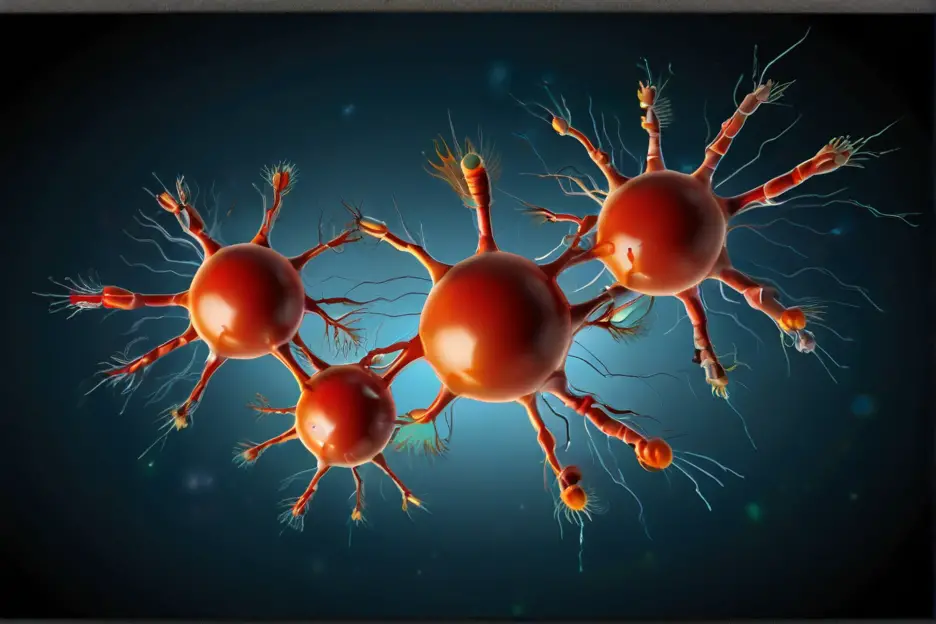
Neurotransmitters are chemical messengers that play a crucial role in transmitting signals between nerve cells in the brain.
These tiny molecules are responsible for various physiological processes, including mood regulation.
In this blog post, we’ll explore the key neurotransmitters that influence mood, how they work together, and the external factors that can impact their levels.
Key Mood-Influencing Neurotransmitters
Serotonin
Often dubbed the “feel-good” neurotransmitter, serotonin is like the brain’s mood stabilizer.
It’s crucial for feelings of happiness, contentment, and general well-being.
This chemical messenger also helps regulate sleep patterns, appetite, and digestion.
When serotonin levels are balanced, you’re more likely to feel calm and satisfied.
However, when levels drop, it can lead to feelings of depression, anxiety, and even insomnia.
That’s why medications like SSRIs (selective serotonin reuptake inhibitors) are often prescribed to help boost serotonin levels and alleviate symptoms of mood disorders.
Dopamine
Known as the brain’s reward neurotransmitter, dopamine is the key player when it comes to motivation, pleasure, and reinforcement.
It’s what makes you feel good when you achieve a goal, receive a compliment, or indulge in something enjoyable.
Dopamine also plays a crucial role in addiction, as it’s responsible for the “high” experienced with substances like cocaine, amphetamines, and even activities like gambling or gaming.
When dopamine levels are imbalanced, it can lead to conditions like Parkinson’s disease, depression, or addictive behaviors.
Norepinephrine
Think of norepinephrine as your brain’s natural adrenaline.
This neurotransmitter helps keep you alert, focused, and energized.
It’s like the fuel that powers your fight-or-flight response, preparing your body to react swiftly in stressful or dangerous situations.
Along with adrenaline, norepinephrine increases heart rate, blood pressure, and blood sugar levels, getting you ready to tackle whatever challenges come your way.
However, chronic stress or imbalances in norepinephrine levels can contribute to anxiety disorders, attention deficit hyperactivity disorder (ADHD), or even post-traumatic stress disorder (PTSD).
GABA
Gamma-aminobutyric acid (GABA) is your brain’s calming agent. It’s like a natural tranquilizer that helps promote relaxation, reduce anxiety, and improve sleep quality.
GABA works by inhibiting the activity of excitatory neurotransmitters, essentially putting the brakes on your brain’s overactive circuits.
When GABA levels are sufficient, you feel calm, collected, and ready for restful sleep.
However, when GABA levels are low, it can lead to increased anxiety, insomnia, or even seizures.
That’s why supplements or medications that enhance GABA activity are sometimes used to alleviate symptoms of anxiety disorders or sleep disturbances.

How Neurotransmitters Work Together
Neurotransmitters don’t operate in isolation. Imagine an orchestra where each instrument represents a neurotransmitter.
For a harmonious mood, the instruments need to play in balance:
| Neurotransmitter | Function |
| Serotonin |
Provides the baseline feeling of contentment.
|
| Dopamine |
Adds a spark of motivation and joy.
|
| Norepinephrine |
Keeps you focused and energized to pursue those goals.
|
| GABA |
Helps you unwind and recharge after a busy day.
|
However, if the instruments become unbalanced, the music can become unpleasant. For instance:
- Low serotonin can contribute to feelings of depression and anxiety.
- Excessive dopamine might be linked to addiction.
- Norepinephrine depletion could lead to fatigue and difficulty concentrating.
- Disrupted GABA activity can cause sleep problems and restlessness.
Therefore, maintaining a balance between these neurotransmitters is crucial for emotional well-being.

External Influences on Neurotransmitters
Diet
What you eat can significantly influence neurotransmitter production in your brain.
Certain nutrients serve as building blocks for neurotransmitters, affecting your mood and mental well-being.
For instance, tryptophan, an amino acid found in foods like turkey, cheese, and eggs, is a precursor to serotonin, the “feel-good” neurotransmitter.
By consuming foods rich in tryptophan, you provide your body with the raw materials it needs to produce serotonin, potentially boosting your mood and promoting feelings of happiness and relaxation.
Exercise
Getting your body moving isn’t just beneficial for your physical health—it also has profound effects on your brain chemistry.
Physical activity stimulates the production of endorphins, often referred to as the body’s natural painkillers or “feel-good” chemicals.
These endorphins act as neurotransmitters, interacting with receptors in your brain to reduce pain perception and promote feelings of euphoria and well-being.
Sleep
Adequate sleep is crucial for maintaining optimal neurotransmitter balance and emotional stability.
During sleep, the brain undergoes essential processes to replenish neurotransmitter levels and consolidate memories.
Lack of sleep disrupts these processes, leading to imbalances in neurotransmitter activity.
For example, insufficient sleep can lower serotonin levels, leaving you feeling irritable, anxious, or depressed.
It can also impair dopamine function, affecting motivation, reward processing, and mood regulation.
Stress
Chronic stress can take a toll on your brain chemistry, particularly affecting neurotransmitter levels implicated in mood regulation.
When you experience stress, your body releases hormones like cortisol and adrenaline, which can deplete neurotransmitters such as serotonin and dopamine over time.
This depletion can exacerbate symptoms of mood disorders like depression and anxiety, making it harder to cope with stressors in the long run.

Maintaining Neurotransmitter Balance: Tips for a Healthy Mood
Healthy lifestyle
Adopting a healthy lifestyle is key to supporting optimal neurotransmitter function and maintaining a balanced mood.
Eating a diet rich in nutrient-dense foods provides the vitamins, minerals, and amino acids necessary for neurotransmitter synthesis.
Regular exercise not only boosts endorphin production but also enhances circulation, which helps deliver neurotransmitters efficiently throughout the brain.
Quality sleep is equally important, as it allows the brain to recharge, replenish neurotransmitter stores, and consolidate memories.
Stress management
Chronic stress can disrupt neurotransmitter balance, leading to mood disturbances and other mental health issues.
Incorporating stress management techniques into your daily routine can help counteract these effects.
Practices like meditation, yoga, tai chi, or deep breathing exercises can promote relaxation, reduce cortisol levels, and restore equilibrium to neurotransmitter systems.
By making time for stress-relieving activities, you can better cope with life’s challenges and maintain a positive outlook on the world around you.
Mindfulness
Cultivating mindfulness involves being present in the moment, non-judgmentally observing thoughts and feelings, and fostering a sense of acceptance and compassion toward oneself and others.
Mindfulness practices, such as meditation, mindful eating, or body scans, can help regulate emotions, reduce rumination, and enhance overall mental well-being.
By training your brain to focus on the present moment and let go of worries about the past or future, you can improve mood regulation and build resilience against stressors that may arise.
Seeking professional help
If you find yourself struggling with persistent mood issues despite implementing lifestyle changes, it’s essential to seek support from a healthcare professional.
A doctor or mental health provider can assess your symptoms, identify any underlying causes or imbalances in neurotransmitter function, and recommend appropriate treatment options.
This may include therapy, medication, lifestyle modifications, or a combination of approaches tailored to your individual needs.

Conclusion
Neurotransmitters play a vital role in regulating mood and emotional well-being.
By understanding the key neurotransmitters involved and the external factors that can impact their levels, we can make informed decisions about our lifestyle choices to maintain a healthy mood.
Remember, a balanced approach to diet, exercise, sleep, stress management, and seeking professional help when needed can help you achieve optimal neurotransmitter balance and overall well-being.
FAQs
The time it takes for neurotransmitter levels to return to normal after stress can vary depending on the individual and the severity of the stressor. In some cases, it may take weeks or even months for levels to fully recover.
While some dietary supplements, such as probiotics or omega-3 fatty acids, may have a positive impact on neurotransmitter function, it’s essential to consult a healthcare professional before starting any supplement regimen.
Yes, exercise can help regulate neurotransmitter levels by increasing endorphin production and promoting overall neurotransmitter function.


